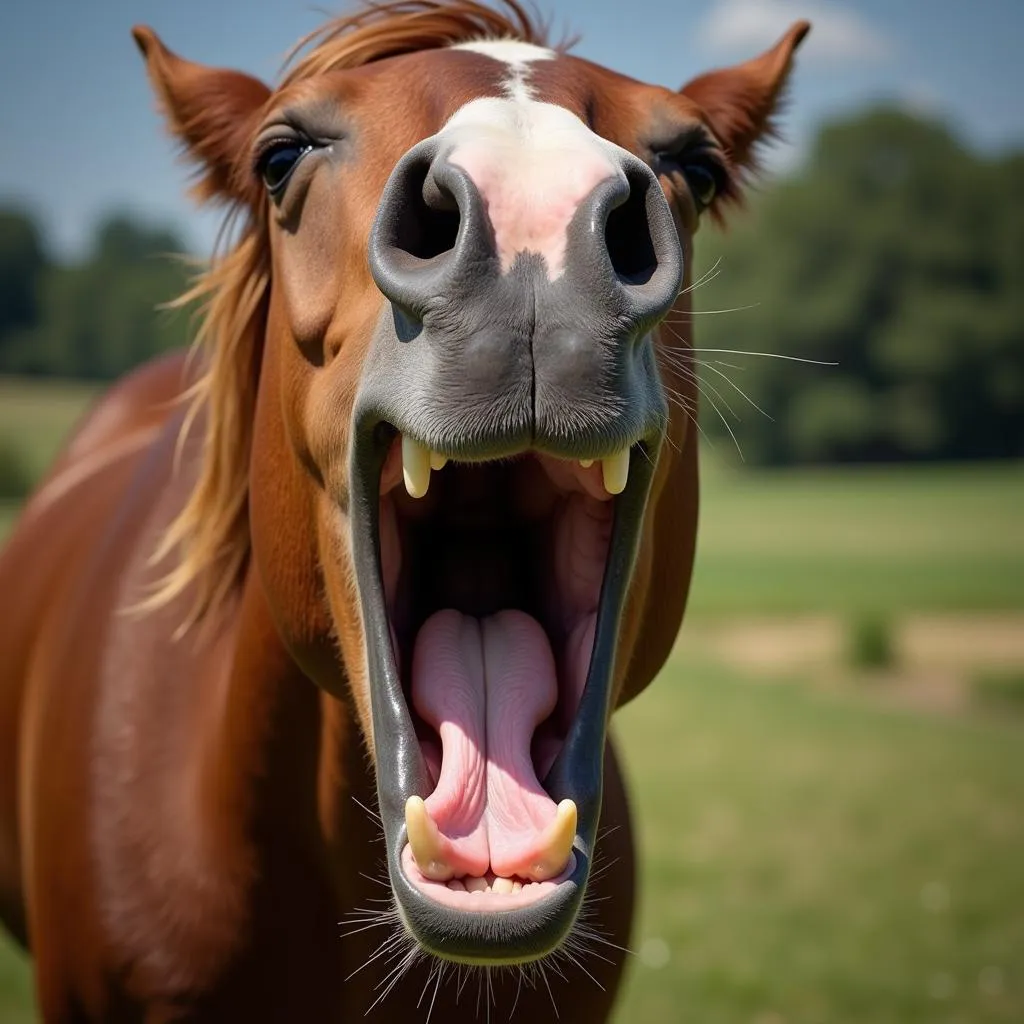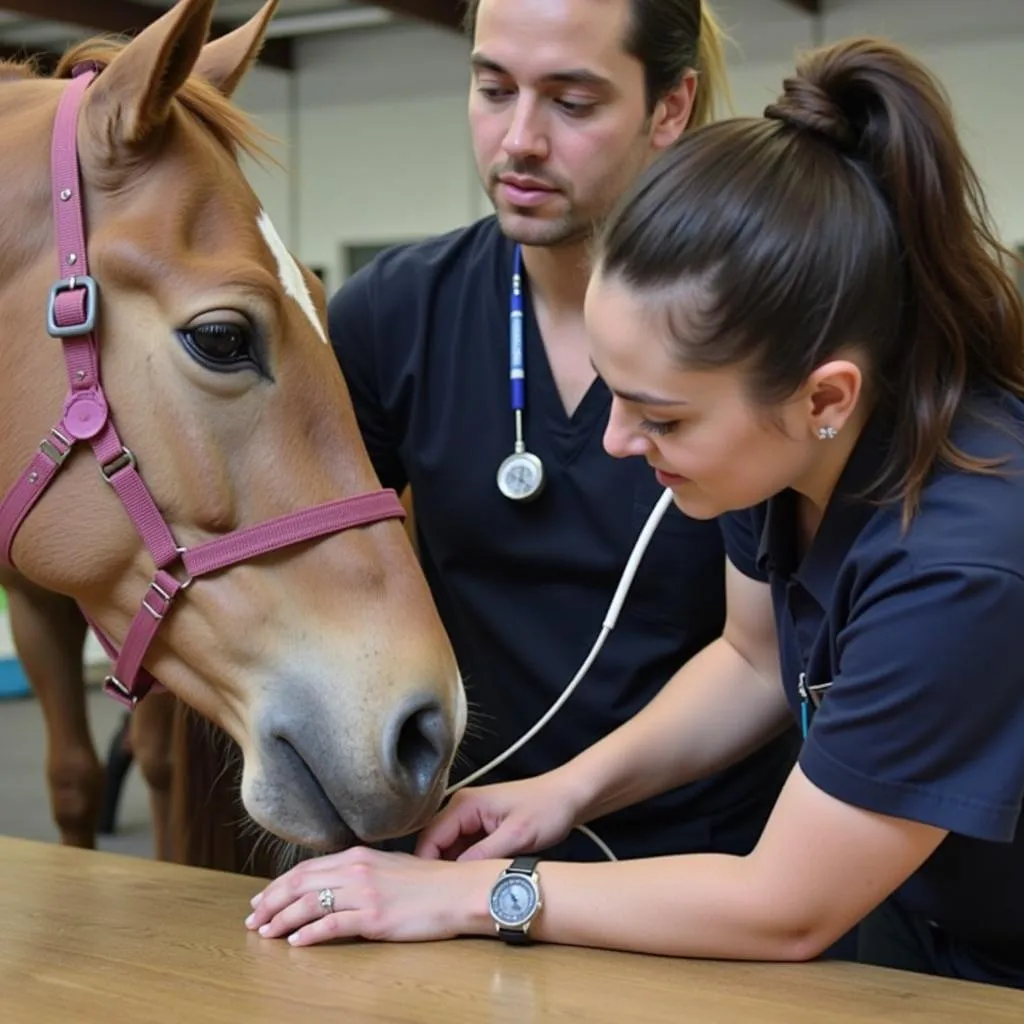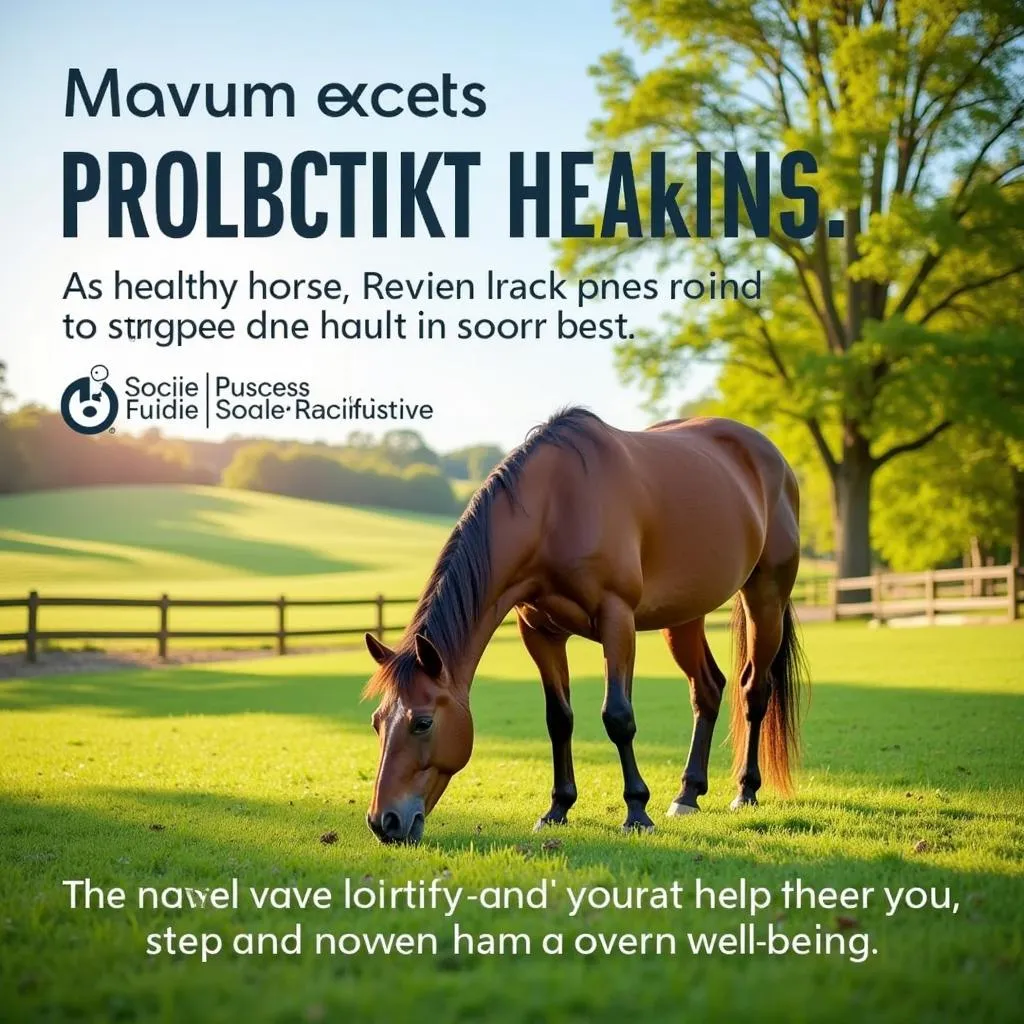Horse yawning – we’ve all seen it. Maybe your horse lets out a big one after a nap, or you notice it more frequently throughout the day. While yawning is a natural behavior in horses, as in humans, excessive yawning can sometimes be a subtle sign of discomfort, and one potential culprit is gastric ulcers.
This article delves into the link between Horse Yawning And Ulcers, exploring the potential reasons behind this connection and shedding light on other symptoms that horse owners should watch for.
Understanding Equine Gastric Ulcers
Equine Gastric Ulcers (EGUs) are lesions that develop on the lining of a horse’s stomach. These painful sores are a common health concern in horses, affecting their well-being and performance. EGUs are often linked to factors such as stress, diet, and exercise routines.
There are two main types of EGUs:
- Squamous Ulcers: These ulcers form in the upper portion of the stomach, which is not protected by the same mucous barrier as the lower section.
- Glandular Ulcers: These ulcers occur in the lower part of the stomach, affecting the glandular mucosa.
Both types of ulcers can cause discomfort and lead to behavioral changes in horses.
The Possible Link Between Horse Yawning and Ulcers
While more research is needed to establish a definitive connection, many equine veterinarians and experts believe there’s a correlation between frequent yawning in horses and gastric ulcers.
The theory behind this link lies in the discomfort and pain ulcers cause. When a horse experiences the burning sensation of an ulcer, especially during digestion, it may trigger a yawn reflex. This could be the horse’s way of attempting to relieve the discomfort by stretching the abdominal muscles and altering pressure within the stomach.
 Close-up of a horse yawning
Close-up of a horse yawning
Other Symptoms of Ulcers in Horses
While yawning has been suggested as a potential indicator of ulcers in horses, it’s crucial to remember that it’s not a definitive symptom on its own. Horses experiencing gastric ulcers may exhibit a range of other signs, including:
- Changes in appetite: Loss of appetite, decreased enthusiasm for food, or picky eating.
- Weight loss: Gradual or sudden weight loss despite a normal diet.
- Dull coat: A lackluster or rough hair coat.
- Behavioral changes: Increased irritability, aggression, or depression.
- Colic symptoms: Signs of abdominal pain such as pawing, flank watching, or rolling.
- Poor performance: Decreased athletic performance, reluctance to work, or difficulty concentrating.
 Veterinarian examining a horse for potential ulcers
Veterinarian examining a horse for potential ulcers
When to Contact Your Veterinarian
If you notice your horse yawning excessively or exhibiting any of the symptoms mentioned above, it’s essential to consult your veterinarian promptly. Early detection and treatment are crucial in managing EGUs effectively and preventing further complications.
Your vet can conduct a thorough examination and may recommend additional tests, such as gastroscopy, to confirm the diagnosis.
Managing and Preventing Equine Gastric Ulcers
Managing and preventing EGUs often involves a multifaceted approach:
- Dietary adjustments: Providing frequent, small meals; minimizing high-starch concentrates; increasing forage intake; and ensuring access to fresh, clean water.
- Stress reduction: Minimizing environmental stressors, providing companionship, and establishing consistent routines.
- Medications: Your veterinarian might prescribe medications, such as omeprazole, to reduce stomach acid production and promote healing.
 Horse grazing peacefully in a lush pasture
Horse grazing peacefully in a lush pasture
Conclusion
While the link between horse yawning and ulcers requires further investigation, it’s a potential signal worth noting. By paying close attention to our horses’ behavior, including subtle signs like yawning, we can become more attuned to their overall well-being. Remember, early detection and intervention are crucial for effectively managing EGUs and ensuring our equine companions live healthy, comfortable lives. If you have any concerns about your horse’s health, don’t hesitate to contact your veterinarian.
FAQ
1. Is yawning the only sign of ulcers in horses?
No, yawning alone is not a definitive sign of ulcers. Horses can yawn for various reasons, including fatigue or boredom. However, excessive or unusual yawning, combined with other symptoms, warrants veterinary attention.
2. Can stress really cause ulcers in horses?
Yes, stress is a significant contributing factor to EGUs. Horses are creatures of habit, and changes in routine, transport, competition, or stall confinement can elevate stress levels and increase the risk of ulcer development.
3. How are ulcers in horses diagnosed?
A definitive diagnosis often requires a gastroscopy. This procedure involves passing a flexible endoscope into the horse’s stomach to visually examine the lining for ulcers.
4. Can ulcers in horses be cured?
With appropriate treatment and management, many horses recover well from ulcers. However, EGUs can be a recurring issue, so long-term management strategies are often necessary.
5. What should I feed a horse with ulcers?
Consult your vet for specific dietary recommendations, but generally, a high-forage, low-starch diet is beneficial. Frequent, small meals are preferable to large, infrequent feedings.
6. Can I prevent my horse from getting ulcers?
While it’s impossible to entirely eliminate the risk, you can significantly reduce it by minimizing stress, providing a healthy diet, and establishing consistent routines.
7. Are certain breeds of horses more prone to ulcers?
Thoroughbreds are often cited as being more susceptible to ulcers, potentially due to their high-strung nature and intense training regimes. However, ulcers can affect any breed or discipline of horse.
Need help with your horse? Contact Justus Horses USA today! Call us at 0772127271, email us at [email protected] or visit us at QGM2+WX2, Vị Trung, Vị Thuỷ, Hậu Giang, Việt Nam. Our dedicated team is available 24/7 to assist you with all your equine needs.